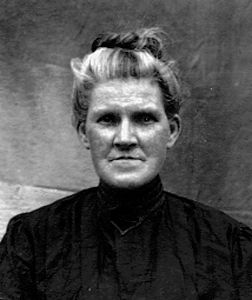

Nora Cross was the main fiddler in a notorious section of Bristol known as the "Devil's Hideout." (Photo Contributed by Bud Phillips/Bristol, Va.)
** This story was published Aug. 24, 2008 in the Bristol Herald Courier. **
Bristolians have always loved their country music.
Long before the now-famous recordings of 1927 made here in Bristol, local residents often had gatherings at which renderings of the mountain and hill country style music were greatly enjoyed.
The fiddle and the banjo seemed to be, by far, the most popular instruments used. And when these were played in that "old-time" style, spontaneous dancing often resulted.
Usually, this was of the "buck dancing" style (that is, individuals danced along following no formal rules, but just "jigged" about as they desired).
Some of these mountain music performers were masters of the art and would be very popular if they were living here today. Among the "masters" of the fiddle was Nora Cross. Some said that she was so good, that her fiddling would make a preacher dance.
Cross lived somewhere in the hills north of the road that leads toward Blountville, probably in the vicinity of the headwaters of Boozy Creek.
During warm weather, she usually walked barefoot the several miles into Bristol carrying her ancient and highly prized apple wood fiddle. It had belonged to her great-grandfather who supposedly had played it in the presence of George Washington at Valley Forge.
Indeed, that ancestor had claimed that Washington had "jigged" for him when he played.
And wherever Cross took her seat to play, there were always those in attendance who couldn't keep from dancing. She always said that she couldn't play a lick unless she had her right foot free to pat, and pat she did.
And if playing in a building, she could shake the window lights with that patting foot. Her time keeping has been described as less "foot-pattin' " and more "leg-raising foot stompin.' "
But there wasn't much of a place downtown to dance. So it was that a rather large platform was erected at a place near the town called the "Devil's Hideout."
Up where Mary Street merges with Piedmont was a shady, brush-covered area that spread around a large, rather cold spring that flowed from under the hill, about where Highland Avenue now begins. It had become a popular gathering place for the "rowdies" of the town to drink, gamble and tell profane stories. And often, they were joined by several "shady ladies" of the town.
There, on weekend nights, fiddlin' Nora Cross, as she was often called, made the lively music while the rowdies, joined by some of the more respectable of the town, danced until the wee hours of the morning. She was often assisted in this lively music making by Steve Faidley, a master of the banjo.
A super-moralist of the town, who also happened to be rather wealthy, became so dismayed by the goings on at the Devil's Hideout that he bought the site, cleaned up the land and burned the platform.
No problem - the crowd just moved over to what later became known as the "Furnace Bottom" (beyond Commonwealth near present Euclid Avenue -right across from the present Food City). There, they built another platform and danced on.
Sometime later, probably in the late 1880s, Cross fiddled as usual to well past midnight. Then, taking her treasured fiddle under her arm, she began the long journey through the darkness to her home out in the hills.
No one ever knew what happened to her. She just simply disappeared without a trace, and no one knows her true fate to this day.
Historical note: A few years ago, a writer from New York state called me and asked if I had a picture of Nora Cross. He was writing a book on musicians of the Southern Highlands. He also wanted my version of the story for inclusion in his book.
I sent the picture and have been told that it has been published. I have often wondered how this writer knew of Cross and expect that it simply adds to the mystery of this old time fiddler from the hills of Tennessee.
BUD PHILLIPS is a local historian and author. He can be reached at (276) 466-6435.